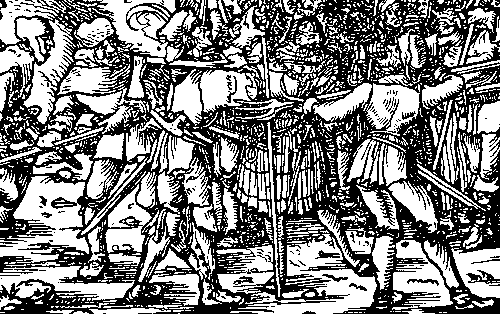|

Q
By Luther Blissett
Heinemann, £14.99; 528 pp
ISBN 0 4340 1000 6 |
THE
dust jacket reads "Luther Blissett", so you'd be forgiven
for thinking the ex-Watford and AC Milan footballer, who earned himself
the nickname Missit during his brief career in Serie A, had decided
to put pen to paper. That Luther Blissett is not the author of Q,
a historical novel set in the peasant wars of the 16th century.
The Luther Blissett behind this book is a fantasy, a pseudonym adopted
by four members of an Italian writers' workshop. When Q was first
published in Italy in 1999, some reviewers suggested that the author
might be Umberto Eco.
It was a fair guess. This is a novel that takes History - with a capital
H - as its subject. It announces its intent on the first page with a
timeline of the events leading up to Martin Luther nailing his 95 theses
to the door of Wittenberg Cathedral before following the fall-out over
the next 40 years in a Europe wracked by schism.
It's like a vast mural on the walls inside an Italian palazzo. Europe's
religious groups and their protagonists are fleshed out, one after another.
Over here we watch Luther and Philipp Melanchthon debating theology
at Wittenberg University; over there we see the flame of revolution
taken up by the religious firebrand Thomas Muntzer and the peasants'
revolt that reaches a bloody climax in the siege of Frankenhausen. Other
scenes show the Anabaptist council at Munster savagely repressed, a
secretive Dutch commune, and heresy among the labyrinthine canals of
Venice.
Two faces link all these scenes together. The first is an Anabaptist
known as Gert, who assumes a series of false names throughout the novel
as he travels between the centres of religious ferment, a loyal lieutenant
to the revolutionary leadership. The other is his constant shadow, a
Papal spy known only as Q, who lurks unobserved in the background
and reports back faithfully to his master in Rome. Q's strengths and
weaknesses as a novel are natural offshoots of its ambition.
Weighing in at about 600 pages, this is a big book and a big canvas.
Stand back and the panorama is big and bloody and breathtaking: a crush
of colour and crowds, exotic locations and war. The sheer weight of
its authors' historical research provides a convincing backdrop for
the fictional heroes. Close-up, its faults are equally evident. What
Q gains in the breadth of its vision, it loses in focus. It's
hard to put speech in the mouths of real historical figures.
Muntzer, in particular, is a caricature, roaring heretical beliefs like
a premonition of Ian Paisley. The plot's restlessness, the dizzying
switches from one time-frame or place to another, afflict the development
of Gert, who barely has time to follow a train of thought between issuing
one rallying cry and the next.
The blurb describes Q as a subversive novel of ideas - maybe
equating "European" with "brainy". It's hard to
see how that's the case, unless we believe the Pope still rules the
Continent while ruthlessly repressing the proles. Among his revolutionary
acts, "Luther Blissett" has "kidnapped" statues
of the baby Jesus in southern Italy and hijacked a Roman nightbus. From
a purely literary point of view, however, his entertaining novel won't
have anyone clambering on to the barricades.
|
